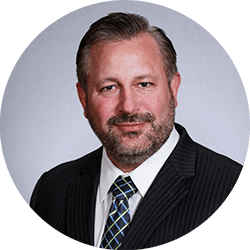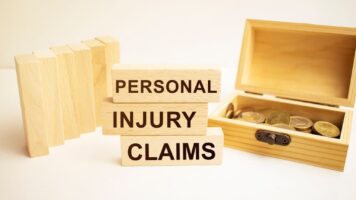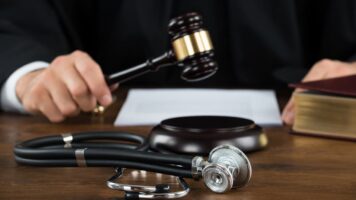You prove premises liability by proving that an individual responsible for an accident acted negligently. The next step is to link the property owner’s negligence to an event that caused an injury, illness, or death.
The victim of a dangerous premises does not have to prove liability for damages. Instead, you can hire a premises liability lawyer to make an evidence-based case on your behalf.
Making a Premises Liability Case by Proving Negligence
Negligence applies to virtually every personal injury and wrongful death case, including premises liability cases.
To win a lawsuit or command a settlement, an attorney must generally prove negligence (in this case, by a property owner) by:
- Establishing the defendant’s duty of care: A duty of care means that someone must act reasonably. As a property owner, a duty of care requires that they seek out hazards that can injure or sicken guests and remove those hazards promptly.
- Proving that the defendant breached their duty of care to the plaintiff: Your lawyer will use all available evidence to prove the property owner breached their duty of care, endangering you as a result.
- Connecting the breach of duty of care and the plaintiff’s injury, illness, or death: An attorney must prove that the breach of duty of care led directly to the harm you suffered, whether it is an injury, illness, or death of a loved one.
- Establishing the damages resulting from the breach of duty of care: Once your attorney establishes the violation of duty of care as the cause of your damages, they will calculate those damages.
Evidence, witness accounts, and expert testimony can all work together to prove someone else’s negligence and responsibility for your injuries. The right attorney can present persuasive evidence of negligence to move your claim forward.
How Can You Prove a Property Owner’s Negligence?
You know the general framework for proving negligence, but your lawyer must have specific evidence to support their argument. An attorney may gather evidence to support your claim in several ways, including:
Interviewing Eyewitnesses
Your attorney should interview any witnesses who saw:
- An accident that caused you to suffer an injury (like a slip and fall)
- Conditions that led to the harm you’ve suffered (such as an uncleaned leak or spill)
- General negligence by the property owner (such as a lack of seriousness about the safety of guests)
- Any other specific or general circumstances related to your premises liability case
Your lawyer may combine existing witness statements with original interviews. This kind of evidence can be reliable and compelling, as eyewitnesses generally have no motivation to lie or embellish.
Obtaining Proof That the Property Owner Has Endangered Others in the Past
Some instances of negligence by property owners are part of a pattern. Your attorney should investigate past negligence by the property owner, including at the site of your accident and elsewhere.
Consulting Experts in Premises Liability
Having experts’ opinions can strengthen your case. An expert may:
- Testify that the property owner’s actions (or failures to act) qualify as negligence
- Explain how the property owner should have acted to protect you from harm
- Reconstruct the incident that caused you harm, potentially using digital software to reenact the harmful event
- Help your attorney calculate the cost of your damages, including any future medical you’re likely to require
There are many kinds of experts whose opinions and services can be helpful in a premises liability case. For example, an Occupational Safety and Health Administration (OSHA) official may be qualified to speak of basic safety precautions the property owner failed to take.
An experienced lawyer may have a network of experts they work with for premises liability cases. Access to such resources is one of the many benefits of hiring a premises liability lawyer.
Photographing and Videographing the Scene of Your Accident
Though it is not always possible for a lawyer to gain access to dangerous premises where their client suffered an injury or developed an illness, it sometimes is.
If it is possible and relevant, your lawyer may:
Visit the dangerous premises, perhaps with an investigative team
- Photograph the premises, including visible hazards (and the specific hazard that caused you to harm)
- Take a video of the premises
- Obtain any relevant video footage from the premises
Your attorney may need to take legal action to acquire evidence in the property owner’s possession, such as security footage.
Conducting Environmental Testing
In cases where someone becomes sick because of exposure to toxic chemicals, mold, asbestos, radon, or other environmental hazard, an attorney may conduct testing to confirm the presence of toxic materials.
Specific Examples of Property Owner Negligence That May Lead to Injury, Illness, or Death
Property owners have a tough job, but they accept their responsibilities willingly.
When it comes to hazards that may cause harm to employees, tenants, customers, or other guests, a property owner must:
- Be aware of hazards that can foreseeably arise on their property
- Understand that some hazards (like mold spores) may not be visible and that routine environmental tests are necessary
- Have a detailed plan for addressing hazards as soon as they emerge
- Train employees how to respond to hazards when the property owner is not on site
- Take all other reasonable precautions to protect invited visitors from injury and illness
With this in mind, some hypothetical (but realistic) examples of property owners’ negligence include:
- Failing to instruct employees to walk the property looking for hazards regularly
- Failing to install CCTV cameras that can help the property owner detect hazards as soon as possible
- Allowing rain to enter the premises, presenting a clear slipping hazard
- Failing to repair broken or uneven stairs
- Failing to install lighting in dark areas of a property
There are countless ways for property owners to endanger others. When negligence causes an injury, illness, or wrongful death, victims are reasonable to expect the property owner to cover their damages.
How Does a Lawyer Prove the Damages That Have Resulted from a Property Owner’s Negligence
Your lawyer has now gathered evidence proving the property owner’s negligence. Now, they must obtain proof of the damages the property owner’s negligence has caused.
Your lawyer may establish your damages by:
- Documenting your injuries and medical care: A lawyer may obtain a copy of every medical bill, X-ray, MRI, and diagnosis related to your premises liability incident. Medical expenses are often among the most costly damage plaintiffs suffer, so your lawyer will document every step of your treatment, recovery, and rehabilitation.
- Interviewing medical professionals: Some victims of dangerous premises suffer disabling injuries. One in five falls causes a severe injury, and you may have long-term symptoms such as limited mobility or chronic pain. If your lawyer needs to understand your future medical care (and the cost of that care), they may interview one or more medical experts.
- Speaking with a mental health expert: You may have mental health struggles because of a property owner’s negligence. A mental health expert can help diagnose conditions like depression, post-traumatic stress disorder (PTSD), substance misuse disorders, and other conditions that may entitle you to compensation.
- Obtaining past income records: Lost income is common damage in premises liability cases. By obtaining proof of your past income, your lawyer may prove how much income your premises liability incident has cost you.
- Speaking with you: Nobody may have better insight into your non-economic damages than you do. Specifically, you can best explain the physical pain, psychological anguish, and emotional distress.
- Obtaining invoices for property-related expenses: If you suffered any property damage during an accident on dangerous premises, your lawyer may include the cost of replacing the property in your case. For example, a premises liability lawyer might obtain the receipt for replacing a phone that sustained damage during a slip and fall.
Those who can grant you compensation—possibly including an insurance company or the lawyer for a negligent property owner—will likely fight your claim or lawsuit. With convincing documentation of your damages, your lawyer will be in a strong negotiating position and may ultimately obtain the compensation you deserve.
Recoverable Damages in a Premises Liability Case
Each plaintiff in a premises liability incident case has different damages. A lawyer investigates their clients’ economic and non-economic damages, calculates the cost of those damages, and negotiates for financial recovery.
Some of the damages that may be part of a premises liability case are:
- Medical expenses: Your lawyer will calculate the cost of all medical services related to your premises liability incident. Common services include ambulance transport, emergency care, hospitalization, medications, and rehabilitation.
- Pain and suffering: Physical pain, psychological distress, emotional anguish, anxiety, depression, post-traumatic stress disorder (PTSD), sleep disruptions, and lost quality of life are forms of pain and suffering you can seek compensation for.
- Professional damages: Lost income, diminished earning power, lost bonuses, missed promotion opportunities, and lost benefits are professional damages you may suffer after a fall or other premises liability incidents.
- Rehabilitation costs: You may receive compensation for any physical, cognitive, and occupational therapy you need. If you receive chiropractic care or any other type of physical treatment for pain, your lawyer may also seek compensation for these services.
- Mental health treatment expenses: If you choose to receive mental health treatment for the psychological toll of your injury or illness, your lawyer should demand coverage of your treatment.
Some premises liability cases involve wrongful death.
Recoverable damages in these cases may include:
- Funeral costs
- The decedent’s pain and suffering
- Surviving loved ones’ pain and suffering
- Loss of the decedent’s income, work benefits, and other forms of financial support
- Loss of the decedent’s contribution to the household (such as accounting, handiwork, and home security)
- Loss of a spouse’s companionship
- Loss of a parent’s guidance
Losing a loved one is immensely painful and, in many cases, financially costly. An experienced attorney will allow you to work through your grief while they fight for a fair financial recovery.
What to Do if You Suffered Harm Because of Dangerous Premises
When you realize you’ve suffered an injury, developed an illness, or lost a loved one because of conditions on a dangerous property, you should:
- First, ensure that you are safe and have a diagnosis for all of your injuries or illnesses
- Second, hire a premises liability lawyer who can pursue compensation while you focus on your health and personal affairs
Keep copies of all related documentation as you seek and receive medical attention. You may also keep a journal documenting the pain, psychological distress, disruptions in your daily routine, and other harm from your premises liability event.
Your lawyer will use such documentation as they lead your claim or lawsuit.
What a Premises Liability Lawyer Will Do for You
Premises liability lawyers lead their clients’ cases from start to finish, performing many duties, including:
- Securing all useful evidence: The more evidence your lawyer can secure, the stronger your case may be. An experienced lawyer will know what kinds of evidence to look for, how to obtain that evidence, and how to use that evidence in your case.
- Documenting your damages: Your lawyer will obtain documentation proving each of your damages.
- Calculating a settlement target: Your lawyer will seek documentation of current and future economic and non-economic damages.
- Completing negotiations: Your lawyer will enter settlement negotiations knowing exactly how much money you deserve. They should settle for no less than the entire financial recovery you are entitled to.
- Completing a trial, if necessary: Trials are not the norm in civil cases, as settlements are the more common outcome. However, your lawyer should be eager to take your case to trial if circumstances warrant.
A premises liability lawyer will answer your questions, provide guidance, and protect your rights throughout your case.
Your Lawyer May Face a Filing Deadline for Your Case, So Don’t Wait to Hire Your Attorney

Daniel J Grimm, Premises Liability Attorney in Missouri
Don’t wait to identify premises liability lawyers in your area. Most personal injury attorney accept premises liability cases, so you should have plenty of options.


